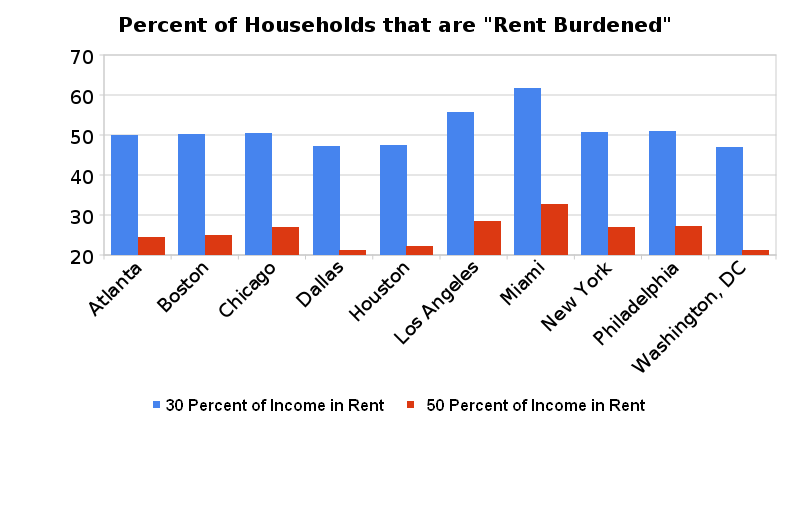John Petro
Low Wages and the Metropolitan Middle Class
The country's stubbornly high unemployment rate is stalling economic recovery. The news emerged on Thursday that jobless claims increased unexpectedly this month, sending the markets nervously downward. Thus, lawmakers at every level of government, from City Hall to the White House, are faced with the enormous challenge of fostering the creation of new jobs.
But the real challenge will be creating good-paying jobs. As Richard Florida points out in the Atlantic, the decline of high-paying blue collar jobs is especially worrying, "The U.S. is losing an important source of good, family-supporting jobs, and... the American labor market is becoming more uneven and increasingly split between higher-paying knowledge work and lower-paying routine service work."
Increasingly in cities like New York, San Francisco, and Los Angeles, those without college educations have fewer and fewer job opportunities--at least in industries that pay good wages. Manufacturing jobs are being replaced by retail jobs and jobs in home-health care, which pay significantly less and offer fewer benefits.
The result is that simply having full-time employment is not enough for middle-class families to make it in metropolitan America. The Welfare to Work reforms of the 1990's may have shrunk the public assistance rolls, but has not necessarily improved financial stability for low-income households. This becomes abundantly clear when looking at how much family income goes towards housing costs. In the ten largest metropolitan areas, one in four renter households pays more than half of their income in rent, and just under half of renter households are considered "rent burdened" by the federal government.
Some commentators insist that in order for middle-class families to get ahead, cities should strive to lower costs. Joel Kotkin, urban historian and self-appointed defender of the suburbs, holds up Houston as the model middle-class metropolis. "A person or business moving there gets an immediate raise through lower taxes and cheaper real estate." Metropolitan areas should encourage sprawl, Kotkin argues, in order to keep home prices low and legacy costs down.
There are things that cities can do to lower costs for middle-income households. Access to a robust public transit system, for example, keeps household transportation costs down. Transportation is the second-highest expense for U.S. households after housing, and the Chicago-based Center for Neighborhood Technology has shown that families that live in walkable, transit-accessible neighborhoods can drastically lower costs.
However, costs are only one part of the explanation; low wages are also to blame. Not surprisingly, of the ten largest metros, the metropolitan area with the lowest median income (Miami) also had the highest percentage of rent burdened households. And the metropolitan area with the highest median income had the lowest percentage of rent-burdened households (Washington, DC).

But cities and metropolitan regions can attack this problem by working to increase wages for middle-class workers. No longer content with the federal and state minimum wage, cities like Santa Fe and San Francisco have implemented their own minimum wage that applies to all workers in city limits. The result in Santa Fe was significantly higher wages in retail and food accommodation--fast growing sectors in our increasingly service-oriented economy. Within one year of implementation, wages in the retail sector grew much more quickly than in neighboring Albuquerque, $617 a quarter faster. For middle-income families, such an increase can be the difference between making the rent payment and facing eviction.
Not only has raising the minimum wage helped those families that received hefty raises, but has also had no negative effects on the city's overall economy. Researchers have overwhelmingly showed that employment in Santa Fe has performed as well or better than Albuquerque after raising wages. After all, you can outsource a manufacturing job, but service sector jobs in retail and home health care have to be local.
As the country eventually emerges from the economic doldrums, policymakers must pay more attention to raising wages for middle-class families. We may be in the middle of a "Great Reset", but without proactive government intervention, wages for most Americans will likely continue to stagnate and fall.
John Petro: Author Bio | Other Posts
Posted at 3:04 PM, Aug 20, 2010 in
Urban Affairs
Permalink | Email to Friend










